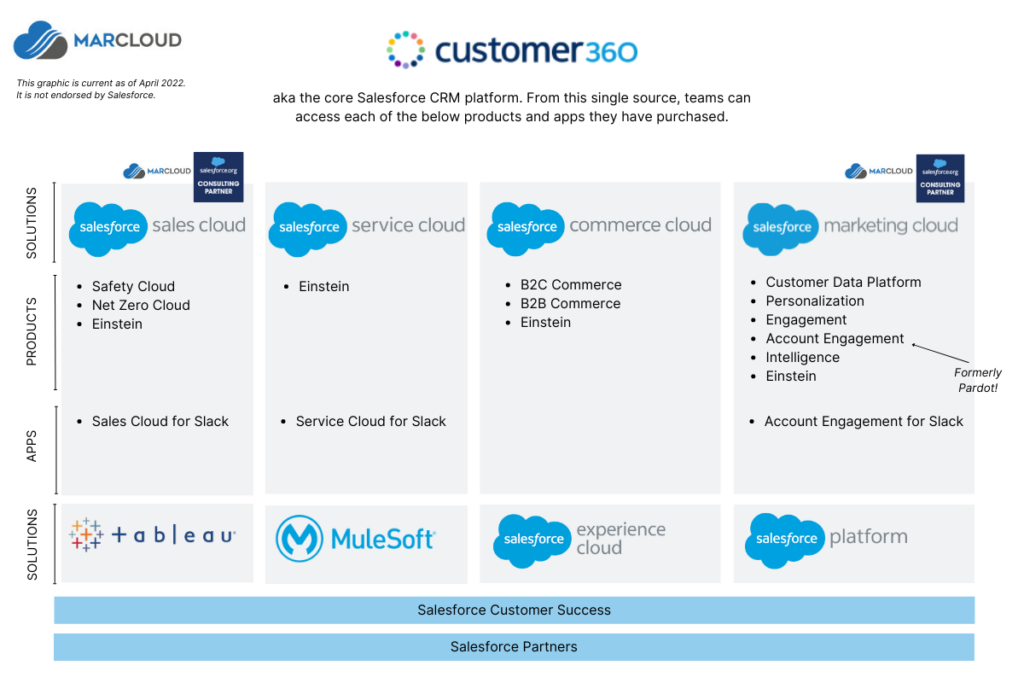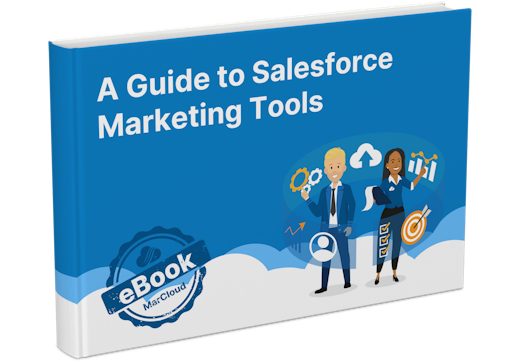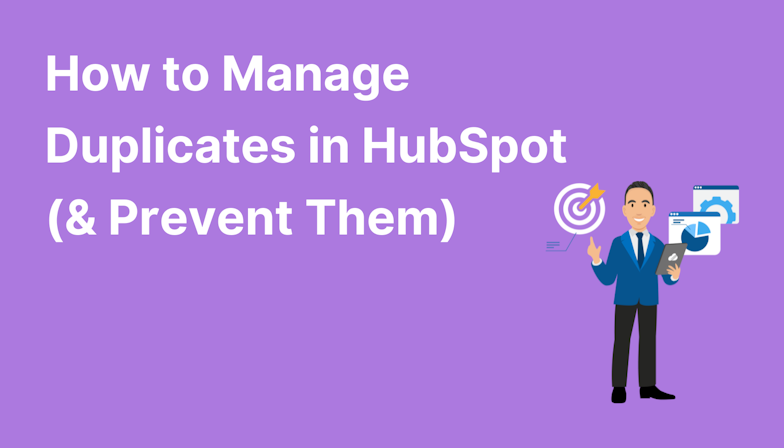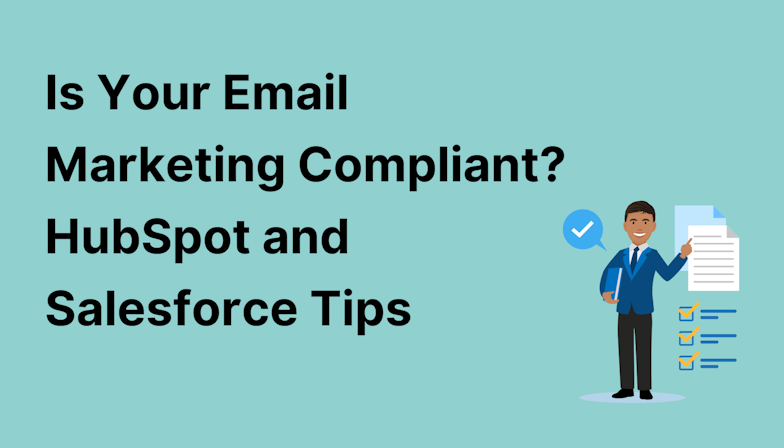Salesforce is a market leader within the automation technology space and for good reason. Founded in 1999, the brand has spent twenty-three years running market research, delivering innovation, and acquiring complementary platforms that now form part of the Salesforce ecosystem.
What began as a startup CRM company, quickly expanded into a full suite of cloud-based products that enable teams to deliver sophisticated marketing, sales, and customer service, from a single source.
With all of this fast change and growth, you’d be forgiven for asking the very common question: is Marketing Cloud part of Salesforce? Many potential customers get confused!
To answer the question, yes, Marketing Cloud, formerly known as ExactTarget, is one of the products Salesforce acquired and now forms part of their ecosystem. It was renamed Salesforce Marketing Cloud not long after the acquisition, in 2014.
So far so simple, right?
Fast forward to April 2022, Salesforce announced the “Next-Gen Marketing Cloud”. By this, they mean how other products within the Salesforce ecosystem will be brought together under the Marketing Cloud umbrella, to form one cohesive name and platform.
Salesforce-owned marketing automation platform Pardot, is renamed to Marketing Cloud Account Engagement. Datorama becomes Marketing Cloud Intelligence, and Salesforce CDP is renamed Marketing Cloud Customer Data Platform.
If you’re still a little confused, you’re not alone. To help current and future customers understand the Salesforce ecosystem, I’ve put together a quick and visual explanation:

How Salesforce solutions & products fit together
As we see it, there are eight core Salesforce solutions that sit within the Salesforce Customer 360 platform:
- Sales Cloud
- Service Cloud
- Commerce Cloud
- Marketing Cloud
- Tableau (Analytics)
- MuleSoft
- Experience Cloud
- Salesforce Platform
Each is designed to complement the others, so that one business with teams across marketing, sales, customer service, ecommerce, business insights, web development etc. can use a single platform to access a 360-degree view of the customer.
The core Clouds’ plus Tableau and MuleSoft are the top-level solutions and within these, there are multiple products. A business may have access to a particular solution but only one or two products within this solution.
Take Marketing Cloud as an example. Marketing teams may have access to the Marketing Cloud solution and specifically, the Account Engagement’ product (formerly called Pardot).
Or, the team could have access to both Engagement’ (the standard Marketing Cloud platform) and Account Engagement’.
Historically, teams would log in to each product individually i.e. Pardot users would log in at pardot.com but moving forward, all team members will access their chosen product(s) with a single Salesforce login. This is the case regardless of whether you are using a product as a standalone or through Customer 360.
Underpinning the Salesforce solutions and products, we have ’add on’ apps that are pre-built and integrated, such as Slack.
Lastly, beyond these platform-specific products and apps, users have access to Salesforce Customer Success and Salesforce Partners (like us!) and the level of access or support customers receive is based on their subscription or arrangement with a partner.
Hopefully, that overview clears up the confusion around the various Salesforce-owned platforms, like Marketing Cloud, and how they all fit together!
Your next question then, is likely: what do each of the solutions and products offer? Perhaps you’re unsure which is the right one for you and need to understand their capabilities a little more. If this is the case, keep reading. I’ll briefly cover each of the solutions and products and their intended uses.
A breakdown of each Salesforce solution
Sales Cloud
Sales Cloud is Salesforce’s jewel in the crown and their original CRM product. The focus of Sales Cloud is to assist sales teams in managing and closing leads and using lead management tools and features such as quoting, product management, and sales forecasting. Sales Cloud could be used for selling to new customers, or upselling to existing customers.
Service Cloud
While Sales Cloud and Service Cloud both involve aspects of customer management, the main difference is that Service Cloud is a CRM focused on existing customer support and resolutions, through email, live chat, and phone services.
Commerce Cloud
Backed by the Salesforce Content Management System (CMS), Commerce Cloud is designed to effectively manage the online commerce delivery and digital sales experience side of a business for both B2B and B2C companies (with products tailored to each). It can be used to build online shopping experiences including personalised recommendations using AI.
Marketing Cloud
Marketing Cloud is Salesforce’s full marketing automation solution, designed to enable you to connect and engage with your customers through email, SMS, social media, and online advertising platforms. It’s about communicating with your marketing database in the most sophisticated and tailored ways. Marketing Cloud Engagement’ is the traditional Salesforce Marketing Cloud platform, complete with Studios’ like Email Studio, Mobile Studio, and Journey Builder.
Marketing Cloud Account Engagement’ is the platform formerly known as Pardot. It’s most valuable to B2B businesses or those B2C companies with long sales pipelines and high-value products and services. Reason being, Account Engagement has superb lead generation and nurture capabilities, along with scoring and grading functionality.
Tableau
Tableau is an analytics platform designed to enhance Salesforce Customer 360 with even deeper insights into performance. It comes with dashboard templates and AI-powered insights, making it easier for businesses to make data-driven decisions in all areas of their business. Tableau connects with many of the Salesforce solutions including Sales Cloud, Service Cloud, and Marketing Cloud to pull valuable analytics into a single place.
MuleSoft
Despite the Salesforce ecosystem being full of great solutions and products, businesses may still require integrations for third-party platforms. Usually, this would mean a lengthy and painful custom API integration process but MuleSoft speeds up this process by allowing you to connect systems to Salesforce. Again, it’s a way of Salesforce ensuring all of your data is united in one place - even if the system you use isn’t Salesforce-owned!
Experience Cloud
By building forums, portals, websites, and more, Experience Cloud provides new avenues for customers, partners, and employees to engage with your business, without the hassle and cost of custom web development. It has a point-and-click Builder and a simple drag-and-drop way of building, that allows all team members - technical or not - to create digital experiences.
Salesforce Platform
This name is perhaps the most confusing of all because so often the Salesforce platform’ is used to describe Sales Cloud; the Salesforce CRM solution. However, Salesforce Platform, or Salesforce Lightning Platform as it’s technically called, is a solution of its own that allows businesses to build custom apps and workflows. It opens up the opportunity to create a business-specific app that directly integrates with Salesforce products. The best part is, there’s little to no code required! So building and bringing an app to market can be done quickly.
Take your pick
As I’ve already mentioned, just because Salesforce offers such a complete suite of platforms and applications, doesn’t mean you have to use all of them. You can use as few or many as you like and connect them and integrate them as you please.
I will say that the more solutions and products you use and connect, the more centralised your customer data and activity will be. This is particularly beneficial for larger organisations with different teams for different areas, but it also works particularly well for smaller businesses looking to get a hold on all of their marketing, sales, commerce and customer service activity in the one place.
When looking at the functions and capabilities of each of the many Salesforce products, it’s easy to see how they have fast become a market leader in the space. And with more plans on the horizon, we’re sure we’ll see even more exciting changes and improvements in good time!
At MarCloud, we specialise in Marketing Cloud but our knowledge extends to other Salesforce products and how these work from a marketing and sales perspective. Want to chat about your automation setup? Send us a message for a no-obligation chat!

Anton Minnion
A data scientist and engineer, Anton has extensive experience in successfully delivering martech and salestech solutions for a variety of clients, both big and small, and across 25 countries. With a scary amount of knowledge in the development space, his focus at MarCloud is on innovating technical solutions for clients but also creating brand new apps and products for Salesforce platforms, to solve common business challenges.
More by Anton MinnionFeatured resource

Salesforce Marketing Tools
With the eBook ‘A Guide to Salesforce Marketing Tools’ in your arsenal, you’ll have a go-to, comprehensive, expert guide to understanding and selecting your perfect Salesforce marketing platform(s), be it Marketing Cloud Account Engagement (Pardot) or Engagement, and the products available to each.
Download now


